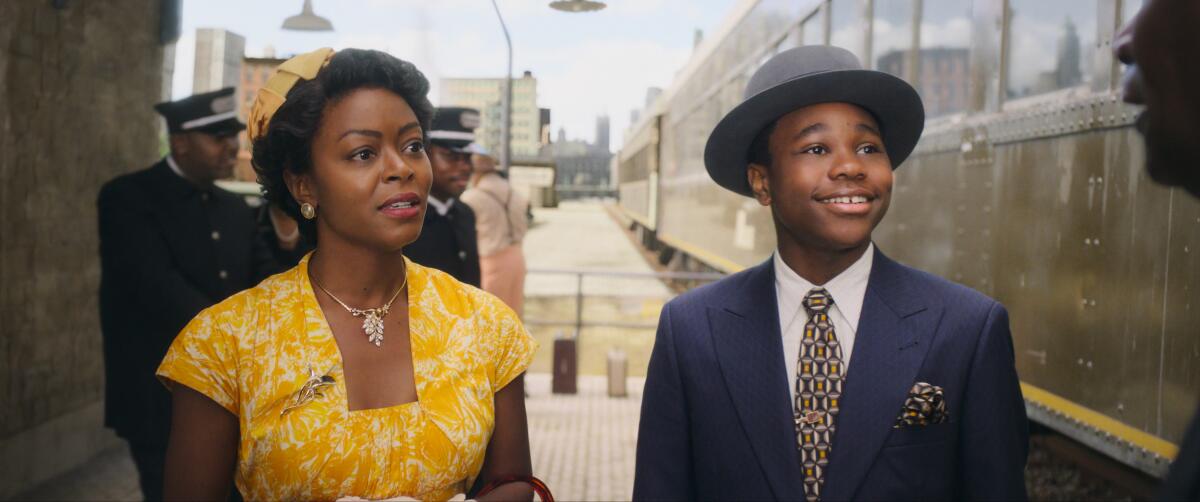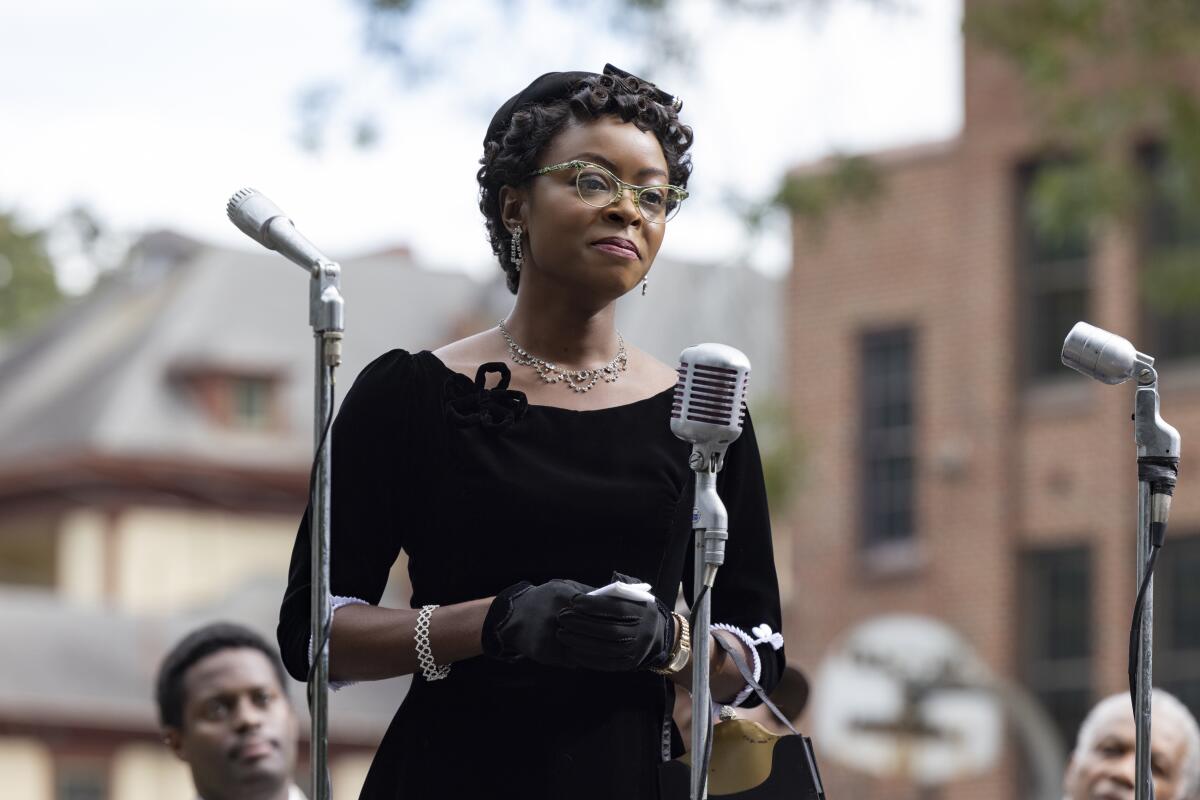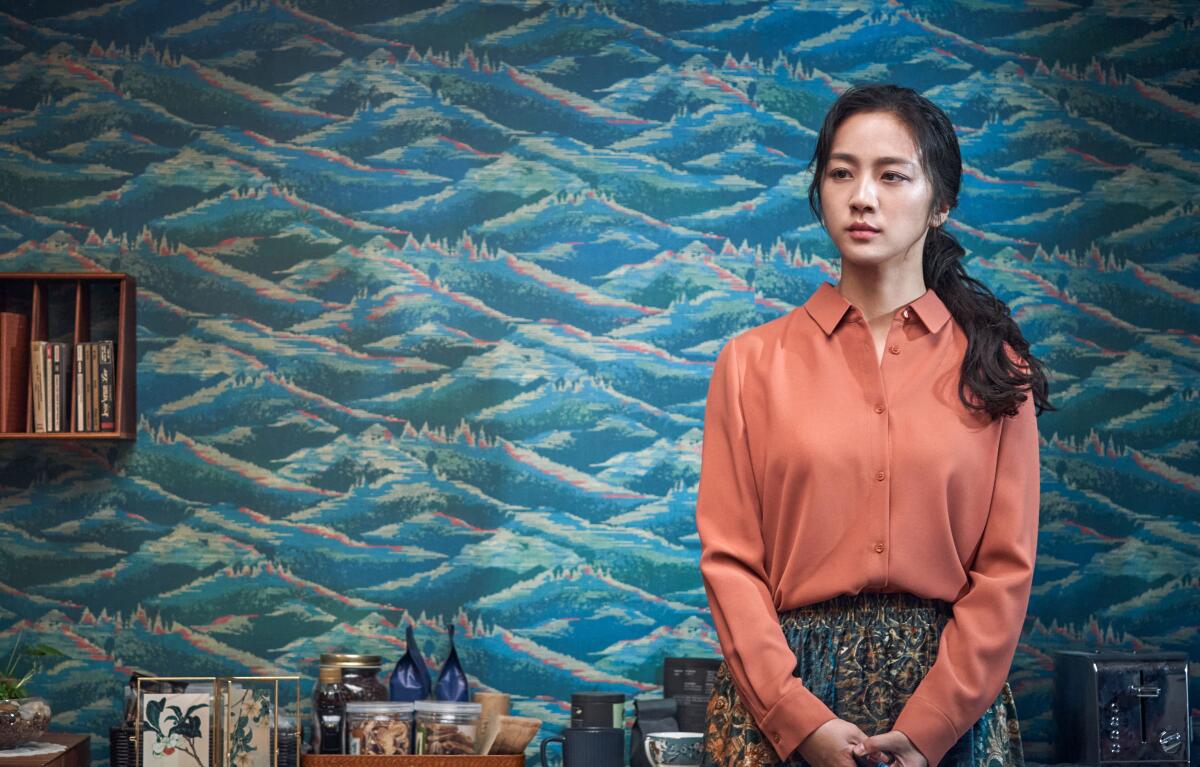History told through a mother’s pain in ‘Till’

- Share via
Hello! I’m Mark Olsen. Welcome to another edition of your regular field guide to a world of Only Good Movies.
Only good movies
Get the Indie Focus newsletter, Mark Olsen's weekly guide to the world of cinema.
You may occasionally receive promotional content from the Los Angeles Times.
Jeff Barnaby remembered. The Canadian Indigenous filmmaker died this week at age 46. Though he had only made two features, “Rhymes for Young Ghouls” and “Blood Quantum,” he was already a deeply influential figure for the way he tied Indigenous-centered themes to elements of genre storytelling.
As he said in an interview with The Times’ Jen Yamato in 2020, “It’s one of the benefits of being a Native film director: You have so much history to riff on … so much to unpack. It’s a lot to take on, being a Native filmmaker, man.”
“Lovers Rock” on the big screen. Steve McQueen’s anthology series “Small Axe” still feels like one of the major works to emerge from the last few years, a deeply felt examination of systemic prejudice and the still-vibrant lives of those who must live within that system. The warm, transportive “Lovers Rock” episode, which depicts a house party in 1980s West London, screens at the Academy Museum’s David Geffen Theater on Sunday with McQueen in attendance for a Q&A. The chance to see this film in one of the biggest, loudest venues in town feels like a rare treat that should not be missed. (Plus, it’s free.)
Ray Liotta tribute. One of those actors whom we probably did not cherish enough when he was with us, Liotta seems like such a loss now that he is gone. The American Cinematheque is mounting a tribute series to the actor, which includes “Something Wild,” “Cop Land,” “Dominick and Eugene,” “Heartbreakers” and, of course, “Goodfellas.” On Saturday, there will be a conversation with author and showrunner Dennis Lehane about working with Liotta on the series “Black Bird.”
Enjoying this newsletter? Consider subscribing to the Los Angeles Times
Your support helps us deliver the news that matters most. Become a subscriber.
‘Till’
Directed and co-written by Chinonye Chukwu, “Till” tells the story of Mamie Till-Mobley (played by Danielle Deadwyler), whose son, Emmett Till, was viciously killed by racist white men in Mississippi in 1955, and how she transformed that horrible event into a catalyst for the civil rights movement. The film is now in theaters.
For The Times, Justin Chang wrote, “Given that this agonizing, emblematically American story has already been memorialized in books, plays, songs, poems and documentaries — and given the sheer number of films and TV shows that claim to illuminate Black trauma and wind up merely compounding it — is a Hollywood movie about Till’s life and death something anyone needs to see? Leaving aside that the word ‘need’ sets a standard few movies would meet, it’s clear enough from ‘Till’ that writer-director Chinonye Chukwu has given these questions serious consideration. And whether or not you agree with all her answers, it’s hard not to appreciate the skill and sensitivity with which she and her co-writers, Keith Beauchamp and Michael Reilly, avoid the pitfalls of either cheap, trivializing uplift or grim, exploitative horror.”
The Times’ Greg Braxton spoke to Deadwyler, who said of the role, “Chinonye and I went over every beat of the script, over and over and over, getting to the heart of what it meant to be the public Mamie and the private Mamie. I had been thinking about the public and private labor of Black women for a real long time. This is the epitome of it. People don’t understand the humanity and the intimacy of the experience of someone who has to carry that kind of symbolism. There was a lot of anxiety and tension-building, because that’s the essence of the role from beginning to end.”
For the New York Times, Manohla Dargis wrote, “With fixed intensity and supple quicksilver emotional changes, Deadwyler rises to the occasion as Mamie, delivering a quiet, centralizing performance that works contrapuntally with the story’s heaviness, its profundity and violence. The weight of Emmett Till’s murder, the horror of it — as well as both the history that preceded his death and that which followed it — is monumental, impossible, really, for one movie. Rather than attempt to convey that significance in its full sweep, Chukwu condenses it into meaningful details, fugitive moments, tranquil ellipses, explosive gestures and, especially, the face of one woman in joy and in agony.”
For RogerEbert.com, Odie Henderson wrote, “The way ‘Till’ depicts Till-Mobley’s scenes with Emmett’s body are sure to be controversial. Chukwu keeps him obscured when his mother first enters the room, which led me to believe he would not be depicted. Then the camera lifts so we can see the full brunt of the damage done. Chukwu takes her time as we witness Deadwyler touching various parts of her son, sparing nothing. It felt overwhelming, and I was of two minds about this sequence. On the one hand, it felt a bit exploitative despite its undeniable power. On the other, Mamie Till-Mobley wanted the world to see what those men had done to her boy; so strong was her desire that she had an open casket funeral and put his body on the cover of Jet Magazine. Some criticized her for doing this, so in a way, ‘Till’ is honoring this decision.”
For the Playlist, Robert Daniels wrote, “After the murders of George Floyd, Laquan McDonald, Breonna Taylor, and too many more, what effect does Black martyrdom and the publication of trauma have today? Maybe asking that question is applying a 2022 mindset to a 67-year-old event, but not even a period piece can merely live in the vacuum of the past. It must, especially in the case of a politically influential figure, speak to the moment of now. ... Though ‘Till’ can not rewrite all of history’s wrong, you never doubt the genuineness of Chukwu’s intentions. This isn’t a salacious film. This isn’t taking advantage of Emmett Till’s memory for cheap prestige. Rather ‘Till’ is an urgent and reverent, albeit flawed, pursuit of justice.”

Enjoying this newsletter? Consider subscribing to the Los Angeles Times
Your support helps us deliver the news that matters most. Become a subscriber.
‘Decision to Leave’
Directed by Park Chan-wook, who co-wrote the screenplay with Chung Seo-kyung, “Decision to Leave” won the best director prize at Cannes and is South Korea’s submission for the Academy Award for international feature. A police detective (Park Hae-il) finds himself drawn to a recently widowed woman (Tang Wei), a suspect in her husband’s death — whether for reasons personal or professional is unclear even to himself. The film is playing now in theaters.
For The Times, Justin Chang wrote, “A genre maestro with both a flair and a weakness for grandiose stylistic flourishes, Park seizes upon Hitchcock’s aesthetics of voyeurism and desire and pushes them to new extremes of high-tech fetishism. At one point, he conducts a virtuoso mini-seminar on the male gaze, as Hae-joon, spying on Seo-rae from a distance, suddenly imagines himself standing in the same room beside her. … And when Park slips the camera behind the window of a smartphone screen, peering out at Hae-joon from behind a row of typing-awareness-indicator bubbles, the movie’s formal playfulness takes on an eerie, melancholy undertow. It’s as if we in the audience have suddenly been transformed into miniature ghosts in the machine, silently watching as this impassioned and improbable love story unfolds through the banal filters of 21st century tech.”
Park spoke to Carlos Aguilar about the connections between a detective and a forlorn lover, and said, “Just how a detective needs evidence in order to solve a case, when you’re in love, you also are constantly looking for evidence of whether this person loves you or doesn’t love you. For both the detective and for someone in love, the important thing is to get rid of any prejudices.”
For the New York Times, Manohla Dargis wrote, “On the most elemental level, ‘Decision to Leave’ is a classic detective story driven by Hae-joon’s desire for Seo-rae and by his desire (one shared by the viewer) to know who’s done it and why. But nothing is ever straightforward with Park, an exuberant, adventurous maximalist who likes to kink up narrative and delights in the plasticity of the medium. Here, he plays with time and space, blurs the past with the present and inventively employs flashbacks and fantasy sequences that deepen the mystery, disrupt the flow and draw attention to the filmmaking itself. The effect can be dazzling, and enjoyably dizzying.”
For Variety, Jessica Kiang wrote, “‘Decision to Leave’ is essentially a love story, and it’s a deeply sexy one, though there isn’t a single sex scene, and Hae-joon and Seo-rae scarcely so much as touch, bar one riffling through the other’s pockets or applying sweet-smelling lotion to their callused hands. Instead their soulmate-style bond — complicated, naturally, when Seo-rae’s alibi turns out not to be as solid as it first appeared — is evoked by the two actors’ innately believable natural chemistry, and the stunning choreography of certain scenes, whereby their gestures and movements sync up as though their bodies have always known one another.”

‘Stars at Noon’
Directed by Claire Denis, who co-wrote the adaptation of Denis Johnson’s 1986 novel, “Stars at Noon” shared the Grand Prix at Cannes. Set in present-day Nicaragua, the story follows an American expatriate journalist, Trish (Margaret Qualley), as she falls in with Daniel, an English businessman/espionage agent. The film is in theaters now and available on VOD platforms.
For The Times, Justin Chang wrote, “Few filmmakers can evoke, as fully as Claire Denis does, the intoxication and menace of feeling cast adrift in a world where you don’t belong. … [‘Stars at Noon’] is nominally a political thriller, marbled with sweaty erotic interludes, a few listless chase sequences and a quasi-Beckettian streak of existential aimlessness. It isn’t one of her better movies, but like even her lesser achievements, it warrants more than easy dismissals. It’s a fascinating confluence of talent and tedium; it’s also a story in which tedium — the day-after-day frustration of a stalled, thwarted existence — may well be the point.”
Bonnie Johnson spoke to Denis about adapting Johnson’s novel. As Denis said, “You know, I like Denis Johnson’s style. The words can be slightly old-fashioned, but it’s a sort of cruel humor, like when the Englishman talks about his wife. When he says, ‘I’m used to doing adultery.’ … I asked A24 to send the film to Denis’ wife. I wanted her to watch. It was good for me, not to lose the spirit of Denis. There was no way to think, ‘I am going to adapt this novel and make it my own.’ I tried to stay close to Denis as I could. His wife thought it was close enough.”
For the New Yorker, Richard Brody wrote, “Claire Denis’s new film is an oddly plain adaptation of a novel by Denis Johnson; the action is set in present-day Nicaragua, with nineteen-eighties politics grafted onto it. … Denis revels in the emotional clichés of tropical climates and settings, and her callow protagonists, with their hardboiled mannerisms, are blank slates for international power plays. The film’s most engaging elements are the chilling machinations of secret agents, which are kept mainly offscreen until they impinge on the couple’s affair. Benny Safdie steals the film, as one of those agents.”
For Reverse Shot, Adam Nayman wrote, “Given a pair of warm bodies and a bed to work with, Denis is peerless at choreographing physical intimacy, and Trish and Daniel’s initial flirtations — including a half-funny, half-tense escapade through a local market where they think they’re being tailed — have some of the same giddy, anticipatory throb as ‘Friday Night.’ As long as things are more or less transactional, Trish and Daniel hold our attention, but the slow-burning love story is harder to swallow. … It’d be one thing if we got the sense that these two desperate characters were dangerously wrong for each other, but it’s more like they’re being shoved together by the script: the almost hypnotic autonomy that Denis usually confers on her protagonists — the way her characters push against not only obstacles and each other but the boundaries of the movie itself — is swapped out for a more mechanical brand of manipulation.”

Only good movies
Get the Indie Focus newsletter, Mark Olsen's weekly guide to the world of cinema.
You may occasionally receive promotional content from the Los Angeles Times.




